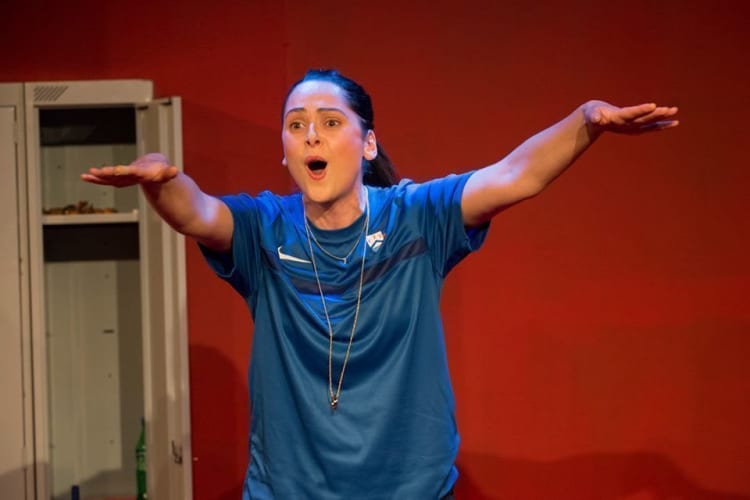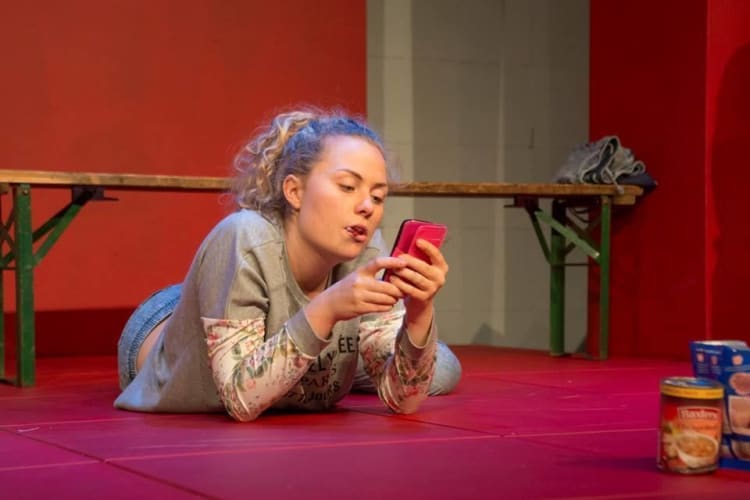The inaugural season at The Other Room—Cardiff’s first purpose-built pub theatre—was cleverly conceived, and a great success, both critically and in terms of bums on seats. The second, perhaps for financial reasons, seems a little less coherent—the current production will be followed by a month-long series of one-off scratch productions and an interesting-looking Christmas show.
The first play is a co-production between the host venue and otherMother, a new company formed by director Anna-Lou Poole and writer Kelly Jones, most recent winner of the Wales Drama Award (presented by National Theatre Wales, BBC Wales and BBC Writersroom). While we await developments re her victorious script, we have Blud.
The action takes place in the abandoned (although distractingly clean) changing-room of a football club somewhere in the London area (Jones being originally from Essex). We are introduced to Rita, one of Cotley Town’s most ardent fans, and a proud hooligan. Cotley’s most prized team-member, Marcus James, has been sold to their more prosperous local rivals Helmsgate.
In order to protest this outrage and make a point to fellow turncoats, including her former fellow girl-gang members, Rita has kidnapped, gagged and bound him. While she waits for her friends and enemies to turn up for the inevitable showdown, Lou, her younger sister, arrives bringing distressing news of their dissolute mother.
The action proceeds as Cotley and Helmsgate play the first game of the season, the radio commentator frequently remarking upon James’s surprising absence. It slowly becomes clear to Rita that her rash actions may well have severe consequences.
The performances are excellent. Francesca Marie Clare is suitably intimidating as the tough-but-vulnerable Rita, impotently protesting against change, frustrated that the upward social mobility represented by both James and Helmsgate is beyond her. Olivia Elsden revels in the more comedic role of her fidgety, exasperating, needy, teasing 15-year-old sibling.
Poole’s direction cleverly points up the older sister’s nervousness, the younger one’s restlessness and the escalating tension inherent in the situation. The sound design (by Chris Young) also plays its part here, as do the off-stage noises made by the increasingly distressed footballer.
Jones’s dialogue is vivid, brisk and not quite naturalistic, the sisters’ articulateness pointing to the possibilities which they have been denied. Several things are left unexplained (the fate of the mother, the mechanics of the kidnapping, the particulars of Rita’s personal life); this is both frustrating and tantalising. The author also makes a virtue of the fact that the story can only end in a limited number of ways, selling us a dummy by teasing us with one kind of darkness before shepherding us towards another.
Blud, as the title suggests, is less about football than family and belonging; the tension between rootedness and aspiration. Rita seems doomed by her limited horizons and tendency towards self-sabotage. Lou is in danger of going down with her.
The play covers no new ground thematically, but the fact that the tale is told from an entirely female perspective injects a welcome freshness. Blud is vivid, resonant and surprisingly funny.

